#Call of Duty eSports team
Explore tagged Tumblr posts
Text
Rising to Elite IV – Jade Ann Byrne & The Jadettes in CODM Ranked Play
Rising to Elite IV – Jade Ann Byrne & The Jadettes in CODM Ranked Play Strap in, soldiers. This is your Commander, Jade Ann Byrne, bringing you the tale of a mission where the eGirl4Rent PMC became an elite force on the battlefield, ranking up not just into Elite III, but pushing forward into the revered Elite IV in Call of Duty Mobile’s ranked play. As the leader of “The Jadettes,” the hottest…
#Call of Duty elite#Call of Duty eSports#Call of Duty eSports team#Call of Duty gameplay tips#Call of Duty Mobile#Call of Duty Mobile consejos#Call of Duty mobile Elite#Call of Duty mobile tactics#Call of Duty mobile tricks#Call of Duty team tactics#CODM battle plans#CODM battle tactics#CODM competitive play#CODM Elite III#CODM Elite IV tips#CODM game modes#CODM gameplay tips#CODM multiplayer tactics#CODM MVP#CODM ranked play#CODM victory strategies#eGirl4Rent PMC#elite gaming strategies#Elite IV CODM#Elite IV strategies CODM#équipe d&039;eSports CODM#estrategias CODM#gaming leadership#gaming psyops#gaming with Jade Ann Byrne
0 notes
Text
eGirl4Rent PMC: Official Press Release – Call of Duty Mobile Recruitment
eGirl4Rent PMC: Official Press Release – Call of Duty Mobile Recruitment For Immediate Release California HQ, eGirl4Rent PMC – We are thrilled to announce that Paladin Jade and the eGirl4Rent Paladinarinas are actively recruiting for Call of Duty Mobile, where we merge our elite skills as a private military corporation with the competitive, adrenaline-pumping action of eSports. Yes, you heard…
#ArtbyJadeAnnByrne#bedrock#bedrock Minecraft#Call of Duty Mobile#CarePackage#Chaos and Destruction#ciberseguridad#Clan Recruitment#Clan Wars#clandestine operations#Combat Ready#Competitive Gaming#contractor militar privado#contractor privado militar#contractors privados#cyber intelligence#cyber warfare#defensa cibernética#digital soldier#digital warfare#Dominate the Leaderboard#eGirl4Rent#eGirl4Rent PMC#egirl4rent server#Elite Players Only#espions numériques#Esports#eSports Army#eSports team#FPS Dominance
0 notes
Text
interview with Gianni Vecchio, about Max
In the meantime, for five years now Vecchio has been part of Verstappen's sim racing team, which got an extra Verstappen-mark last year by it becoming part of Verstappen.com Racing. When he got the invitation in 2018, he could barely believe it. "It was bizar, I was a bit starstruck to be honest," Vecchio begins his exclusive interview with Motorsport.com. "But through the years we've built a sort of friendship. It's not that we see him as a Formula 1 driver all the time, we see him more as a Team Redline team mate. We spend a lot of time together, we practice together a lot. But we also have a lot of fun. It's not just sim racing. We play FIFA together a lot, we play Call of Duty a lot, we play games like Among Us. A friendship has developed. We share a lot of the same interests. It's cool to have someone like him as your team mate, but also as a friend because he keeps pushing you. That's the most important thing in sim racing and sports in general. So yeah, that's not so bad, it's always good to have someone who pushes you."
Not only in the simulator does Verstappen turn out to be competitive, in FIFA he also regularly defeats his Team Redline team mates. "Max wants to be the best in everything he does," Vecchio knows from experience. "He has a few friends in FIFA eSports, named Team Gullit. He plays with them, so he gets tips on the skills he can perform. He's in it completely. When he plays, he's crazy about FIFA. He's the best because he puts the most time in it and has access to the best players," the sim racer laughs.
For Team Redline that mentality is actually one of the big advantages of having Verstappen as a team mate, states Vecchio. "Like I said, it's about having someone who pushes you. If he sees you're making an effort and you really show you want to advance the team and yourself and that you have the same goal of winning everything as he does, then he's one of the best people you can meet," Vecchio praises the two time world champion. "He gives a lot. It's incredible to have someone like that, who pushes you, gives you tips and is also a sort of mentor."
Team Redline has created a safe space for all sim racers and real life racers so they can communicate with each other. That's also why Vecchio considers himself a friend of Verstappen. "It's not like we see each other often during the year, but fact is we are in touch every day.
We send messages to each other and are in voice chat channels. We talk about what's going on in his life but he's also interested in what happens in our lives. He continues to ask what we do, what's on the calendar, what we're doing. That's pretty cool. You know there's someone on the other end who cares about you. Talking to him is like talking to a good friend. It's like we developed a friendship, we know that there's trust and respect for each other. That's something that helps us very much in the team, to have a safe space. It's just great to have that."
And yet, it's not only a positive thing to have Verstappen as a team mate. It happens sometimes that the Dutchman sets a fastest lap in no-time with very little practice. "I wouldn't say it's a bad thing, but sometimes it can be annoying!" Vecchio laughs. "He'll come back from a Formula 1 weekend and we let him know what combination [car and circuit] we're driving. Within five minutes Max Verstappen is P1. And I'm like: 'What's happening here? What am I doing wrong?' He's annoyingly adept at everything he does. I wouldn't say it's irritating but it is something that gets on my nerves sometimes!", he jokes.
On the other hand, Vecchio knows that it's because of his skills that Verstappen makes a good team mate. He's therefore learned a lot from the Red Bull Racing driver in his five years at Ream Redline. "Keep pushing yourself, never give up and even if you're not at 100 percent, then try to find the other one or two percent," the sim racer cites as examples of the things he learned from Verstappen. "Keep pushing beyond your limits in sim racing. Stay focused, keep chasing your goals and stay motivated in everything you do," he rounds off the list.
That's how a lot of knowledge came to the sim racers, but have they been able to teach Verstappen some things? "That's hard to say," laughs Vecchio. "Racing-wise he's a complete driver, he knows what to do in every car. It's not that he's only good in a Formula 1 car, sometimes he tests a GT-car and he's incredible in that, too. As far as racing is concerned, we couldn't teach him very much." Still, Vecchio can name one thing, although that's more to do with the principles of sim racing. "At first, he wasn't a sim racer like we are. We had to explain a little how it works when it comes to managing traffic in multi-class races. Maybe that was something we could teach him a little, but we benefit a lot from him, more than he does from us," the Italian German points out.
That's why Vecchio emphasises that Verstappen's influence on the team should not be underestimated. "It's incredible, really insane. It's like a crane lifting an 8 tons object, that's how I see it. He pushes us, creates opprtunities for us with Heineken, Red Bull, Verstappen.com... He pushes us to the limit because he sees the talent in us. He is like a mentor, he wants to help everyone move forward. It's incredible and cool to see, but the same goes for Atze [Kerkhof, team manager], for everyone in the team. We push each other, but Max is the one who really gives that last 10 percent extra when it comes to pushing.
Because of his busy F1 schedule, Verstappen can't always be found in the simulator. The Dutchman likes spending his free time sim racing and so takes part in special events like 12h Bathurst or 24h Le Mans. Even when he can't participate in those races, he'll be busy behind the scenes to support Team Redline, Vecchio reveals. "Call me crazy, but it's insane. Max has a gaming laptop with all the simulator games: F1, iRacing, anything. When he has time... and call me crazy but it happens every week like that! We're at home with a steering wheel and pedals and he's doing it with a controller. A controller, iRacing, a simulation game, very difficult... Even though he can't really give us feedback, he tries what he can to help us ahead. So it doesn't matter if he's on the road or at home. It doesn't matter. Whatever he has scheduled, he'll practice with us - even if he can't race with us. It doesn't matter to him because he wants to help the team forward. That says it all."
Even though the controller doesn't give nearly the same feedback as a steering wheel and pedals, Verstappen, even on a controller, is hardly inferior to his Team Redline team mates. "It's insane. I always thought talent is in the legs and arms but he even has it in his fingers!" As an example, Vecchio cites the preparation for iRacing's 24h Spa, which was held in the same weekend as the Hungarian GP. "We did a race and he was only three tenths slower! On a controller, compared to us. Can you imagine? Three tenths, on a controller, for an entire stint! It's not over one lap, but several laps. That's bizarre."
#max: friend. team mate. mentor. 🥺#f1#max verstappen#gianni vecchio#team redline#sim racing#max in dutch#my post
140 notes
·
View notes
Text
i'll actually in a limited capacity defend the overwatch league's regional teams gimmick but the execution was bad. having regional teams could have been hype. like--during astralis' 2018-2019 csgo run, danish esports fans went fucking insane for them. and like of course they did. there's inherently something exciting about having a team you can in some way 'identify' with. and geography does create natural sports rivalries and pre-writes your stories.
there were two glaring bad problems in the dumb way blizzard did this though. one is forcing teams to come up with brand new branding. this was a horrible idea. it forced well-established esports organizations with strong fanbases across different games like cloud9 and optic to try and build new brands up from scratch. they realized this with their call of duty leage where they let teams play as 'atlanta faze' and 'optic texas' but yknow. kind of too little too late
the other one (and this is also the glaring fatal flaw in the overwatch league's entire silly, silly business plan) is the idea of a global league. now if you don't know much about esports you might think 'wait whats wrong with that. its gaming you can do it online players can be anywhere'. however that's not true! first of all, esports--well esports doesn't make money, esports when managed correctly is essentially a loss leader for the game it's an esport for--but esports makes a lot of its money on live events. yeah, people go to see esports games:
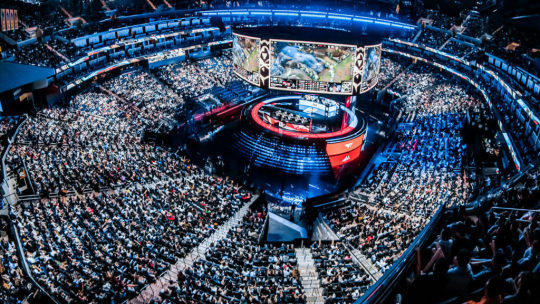
much more importantly, ping is a huge factor in esports. the higher the level you're playing at, especially in a game like overwatch that's full of twitchy hitscan aiming, the more a 10ms latency difference can make or break a game. you need to be running in-person events in order to have a competitive esports league and to make a good chunk of your revenue.
and that means that a global esports league runs into the exact same problem a global normal sports league would run into and the reason why that doesn't exist, which is travel logistics. the overwatch league has a london team, a san francisco team, and a chengdu team. these cities are very far away from each other [citation needed] and although overwatch league people will often blame covid for ruining their plans, i honestly think it actually saved them by preventing the horrible idea they had for how the league would work from actually happening. imagine all the problems that travel causes in a league like the NBA--jet lag, exhaustion, the obvious budgetary expenditure. now imagine that the travel itinerary also includes flights across the atlantic and/or pacific.
that's not even all! the thing about esports is that, because practicing for ten hours a day doesn't physically destroy your body like it would for regular sports, esports players and teams... do that. if you spend seventeen hours on a plane from paris to hangzhou for a match that's seventeen hours where you're not practicing. when you arrive, you can't just stay at a hotel--you need to be able to practice in the days leading up to the match too, especially because it's esports, which means the game can change. if you miss some practice as a sports team, you're gonna be rusty--if you miss some practice as an esports team, the rules of the game might have literally changed since your last practice session.
the result of this, by the way, is that the london and paris teams have never been actually based in europe--and that right now the dallas team is based in korea. it is very silly. every other multinational esport ever invented has created regional leagues--league of legends has a league for korea, china, europe, north america, pacific, vietnam, brazil, japan, and latin america. but blizzard entertainment are god's special little gamers and they weren't going to let something like 'the ocean' get in the way of their global league dream.
and ultimately this means that the entire local team concept was pointless. most of the teams aren't locally based. and even if they were -- the madcap way they play against each other mean that those city affiliations don't matter. when manchester united play liverpool f.c., even if you are not a big football fan, if you're from manchester you presumably have an opinion of liverpool and liverpudlians, and vice versa. there is an emotional hook to latch on to. if manchester united were to play khon khaen united, you would probably say 'where the fuck is khon khaen'. for the localisation to work, the overwatch league's london team needed a manchester or glasgow or dublin or amsterdam or brussels team (etc.) to play against. if you're invested in the esport itself and the players, you can get invested in a philadelphia-london or chengdu-houston rivalry--but the localisation aspect of it isn't doing the work it should there.
tldr: the overwatch league was a bad idea ever since the moment it was announced. people are too harsh on the team localization idea but the way it was executed was hot garbage and it's no wonder this entire venture failed badly
142 notes
·
View notes
Text
Can a video game teach you to resist disinformation?
The U.S. government certainly thinks so: In May, the State Department’s Global Engagement Center (GEC), the government agency tasked with countering foreign disinformation, released a request for proposal offering $1 million for “an evergreen game in a sandbox platform, with an existing fan base, in which participants play a game that builds cognitive resilience to authoritarianism and promotes democratic norms and values.” The call for a sandbox platform refers to open, multiplayer game spaces such as Minecraft, Roblox, or Fortnite, which allow players to build forts, explore virtual worlds, experience short stories, and share experiences. This request is asking for proposals to use creative mode in Fortnite (or a similar platform) to design a custom game experience—only instead of being fun, it is meant to train people to resist Russian disinformation.
It’s an intriguing way to combat an existential challenge for democracy. Can play undermine lies more effectively than speech does? There is a lot about this idea that is compelling, but there are just as many reasons to be skeptical.
The GEC’s idea certainly has some validity. It wants to leverage the emerging field of prebunking—the art of making people aware of disinformation before they encounter it—to help build media literacy skills and contribute to online safety. This is a process that researchers call “inoculation,” which treats disinformation like a virus: You need to train your psychological immune system, so to speak, to learn how to identify and reject bad information. Researchers have suggested different methods for this, ranging from a very literal metaphor of exposing people to “weakened” forms of common disinformation up to complex media literacy training intended to prepare people to identify disinformation on their own.
Using games as part of the battle over information isn’t new. The United Nations Office of Counter-Terrorism has an entire project devoted to understanding the role of video games in what the U.N. calls “countering violent extremism.” Late last year, the Swedish Psychological Defense Agency—which, like the GEC, is empowered to combat foreign disinformation—sponsored research into foreign political interference that uses video games. And the European Journalism Observatory has highlighted video games, specifically, as a vector for disinformation during Russia’s ongoing invasion of Ukraine.
So, the GEC is addressing a serious problem with global implications. And the sandbox anti-disinformation proposal is not the only video game program that the agency is funding. As Aftermath reports, it is also offering $250,000 for a program at the U.S. Embassy in Ukraine that will use the process of building an esports team and hosting an esports tournament to provide “counter disinformation/conflict resolution training to confront foreign propaganda and disinformation in competitive online gaming spaces.” While these sums may seem high, a typical “indie” game (one that is not developed by a major studio) can cost a million dollars or more, and so-called AAA games (such as Grand Theft Auto, Fallout, or Call of Duty) can cost hundreds of millions of dollars to develop.
One challenge that inoculation programs face is establishing success conditions. After all, how do you know when someone is successfully protected against disinformation? There is no good answer for this yet—we can design experiments and surveys to measure how messages are being accepted or rejected by a population, but—like other preventative measures—success is negative. You know the program worked if you don’t see people repeating disinformation, rather than knowing it worked because some tangible finish line has been crossed. It is a problem requiring constant vigilance. In that sense, the GEC’s call for an evergreen (permanent) game to counter disinformation is aligned with broad aspects of disinformation research.
But is a game the best way to do this? For decades, games studies have adopted an argument put forth by Dutch cultural historian Johan Huizinga in the 1930s: Games and play are essential to civilization, because they (however unintentionally) teach children how to socialize and move within rules-based systems in a mirror of society.
Building on those ideas, media theorist Ian Bogost coined the term “procedural rhetoric” in the 2000s to argue that video games instruct players to view the world through a certain set of rules and to discard others—even when trying to “break” a game system, he argued, players are still learning how rules and games work. If one accepts this line of argument, then it would naturally follow that an effort to design a game to inoculate against disinformation has the potential to be highly effective.
There are some problems with this approach. The research into so-called serious games, which are games intended to do something other than entertain, suggests that they are the most effective when they are also fun to play. This is a bit of a contradiction, since a serious game is not made with entertainment as its primary purpose, and that is reflected in the GEC’s call. There is no mention of the evergreen game being fun for its players. The agency, understandably, is focused on the outcomes of the game, not the game itself. But making serious games fun is a hard challenge that researchers are still working on, and without it, the effectiveness of any serious game will be limited.
The fun challenge has plagued efforts to use video games to do achieve goals in foreign policy, statecraft, and human rights since the start of the 21st century. Games such as the International Committee of the Red Cross’s LifeRun (2020) or 11 Bit Studio’s This War of Mine (2011) try to cultivate in players a concern for civilians in warfare. The Lebanese militant group Hezbollah released Special Force (2003) so players can battle against Israeli soldiers in South Lebanon, and Fursan Al-Aqsa (2022), places players in the shoes of a Palestinian student who seeks revenge on the Israeli soldiers who tortured him in prison. Fursan is available on Steam, an online video game marketplace used by players around the world that (relevant for the GEC grants) also restricts sales in Russia and Belarus due to sanctions stemming from Russia’s 2022 invasion of Ukraine.
Militaries have used games for propaganda, too, from America’s Army (2002) to China’s Glorious Mission (2011). Some of these games went nowhere. (Hezbollah, for instance, did not make a fun game.) But others, such as America’s Army, endured for decades because they were fun—and that game became fun by abandoning some of its more serious pretensions as new editions were published.
While it is clear that the GEC is drawing on a large number of precedents, ideas, and projects, is there evidence that any of it works? After studying the Red Cross’s LifeRun game, which seems to be a close analog to the GEC’s call for proposals, scholar Jolene Fisher concluded that there are structural limits to what these games can be expected to do, given their small distribution and limited scale. In a recent report, the Carnegie Endowment for International Peace observed that initiatives to support local journalism and media literacy education were far more effective at undermining disinformation than statecraft or counter-messaging, but the former are also much more difficult to fund, implement, and scale.
Bogost, the media scholar, reflected in 2018 on his experience trying to make “persuasive games” and concluded the concept was more promise than delivery. “It was emotion and novelty that drove much of the interest in this work,” he wrote, not concrete or supportable projects. It could be that games are just an accessible channel to do this work compared to more effective methods.
There are broader issues with the GEC’s plans, too. I wrote my Ph.D. dissertation on the U.S. Army Esports (USAE) team, an effort launched in 2018 in an attempt to use esports to bolster years of flagging recruitment. The U.S. Defense Department certainly seems to be convinced that the team has been effective in growing its recruiting pipeline and boosting morale, however controversial it may be. But it also does not release data to support its claims of effectiveness, and in 2023, the Army announced a major overhaul of the recruiting process due to multiple consecutive years of missing enlistment goals. If the USAE is effective at growing recruitment, that growth was hard to see. (The service claims that it is on track to meet a much lower recruiting goal in 2024).
I wasn’t alone in observing the limited effects that games on influencing thinking. A couple of years ago, games scholar Philip Hammond observed that decades of U.S. military influence on video games has coincided with declining recruiting and less public trust. If games can persuade people, it’s hard to see how.
This does not mean that such programs are a failure, nor does it mean that the GEC’s program is futile. Rather, it indicates that, as Bogost cautioned, we should be clear about the gap between promise and delivery, and mindful of where that gap emerges.
The GEC’s success in persuading social media companies to moderate away Islamist extremist content on their platforms (the most effective way to counter disinformation, according to researchers) suggests that it sometimes can do this work effectively. After all, while the growing presence of extremists in video games is a real concern, it is the community and discourse around games where that extremism tends to emerge, not within the storylines and play of the games themselves.
Games scholar Sky LaRell Anderson calls these conversations “extraludic narratives,” and in studying them found that they form an important basis for building communities around sharing gameplay experiences. Such a dynamic leaves open the potential for the GEC’s sponsored esports team in Ukraine to influence some of those narratives about Russia, or even to cultivate a community of resistance against Russian narratives in Ukraine’s Esports spaces. But researchers find this dynamic hard for outsiders to understand in real time, much less to intentionally shape beforehand. Governments just aren’t cool, and the USAE’s own engagement scandals point to the many scenarios where government sponsorship might be a poison pill.
The GEC has experienced this with its other efforts to counter disinformation. Its successful campaign to contain Islamist disinformation online, when applied to countering Russian disinformation, resulted in the center being subjected to unfair, partisan attacks by far-right politicians in the United States. Republicans in the House of Representatives tried last year to block the center’s budgetary reauthorization, falsely claiming that it targeted conservatives for censorship. Embattled Rep. Darrell Issa disputed the need for a counter-disinformation agency and claimed that the GEC had no successes to justify its budget despite the agency’s successful work countering disinformation.
The dishonest nature of these attacks points to a difficult political environment emerging for the agency. It could be the case that sponsoring games and gaming events is all that the agency has left if platform governance has become closed off by toxic right-wing politics. The GEC is a meaningful organization that treats the threat of disinformation with the appropriate seriousness.
But if politics prevent the agency from responding effectively to disinformation in the venues where it can be the most effective, it is hard to blame it for trying something else. Still, we should be cautious and keep our expectations in check: As unfair as the right-wing attacks on the agency are, and as hard as it works to address disinformation globally, those same attacks will also be carried over to the teams and games the agency sponsors.
Even in an ideal environment, there would be modest expectations for such a small program, but those may be impossible to meet. Disinformation is ultimately a political challenge, not a technical one, and the politics of disinformation in the United States have already tied the GEC’s hands. It’s just not clear how this political problem can be solved with a video game.
10 notes
·
View notes
Text
Hils Watches Cross Fire - Ep 1
Apparently this year is the year I watch all the esports dramas. Don't know a huge amount about this one but it's been on my to watch list for ages, much like The King's Avatar was. Again, it's got a DMBJ actor I like in it. I will try not to compare the dramas too much
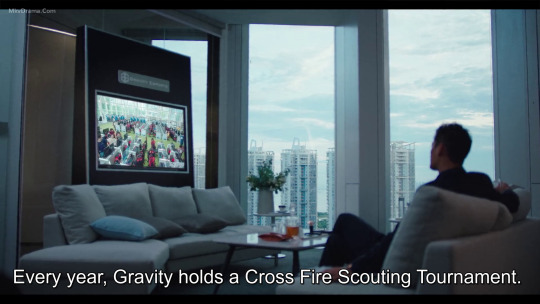
They said the name of the thing in the thing before the opening credits had even started
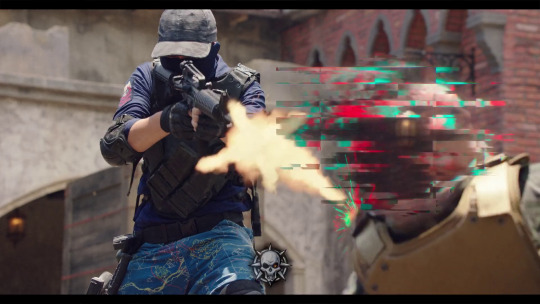
Ooh I like that the in-game footage is a mixture of live action and animation. That's really fun.
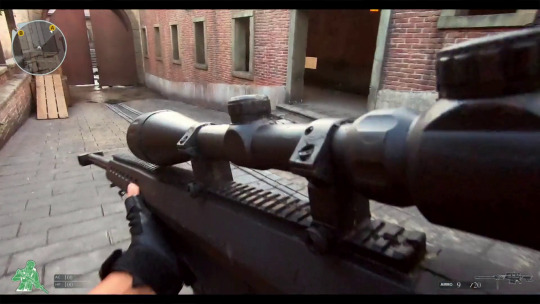
So I'm guessing this is a Call of Duty style game. I'm enjoying the way this is shot

Aww there he is! I do enjoy Wu Lei's dramas. Haven't seen him in a bad one yet so I am hopeful about this one too

I'm guessing King is going to be the antagonist of this story?
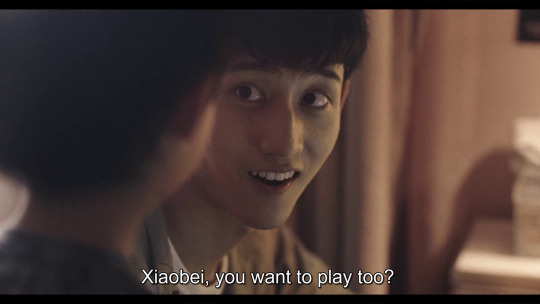
Aww did he get into it because of his brother?

I like that his chair has spikes on the handles to stop other people pushing him. Little way of showing he wants to do things for himself.

This is how we know it's a flashback

I don't know who flashback kid is but apparently his girlfriend broke up with him and married a rich dude because she didn't consider esports a real job. I'm sure this will become relevant later.
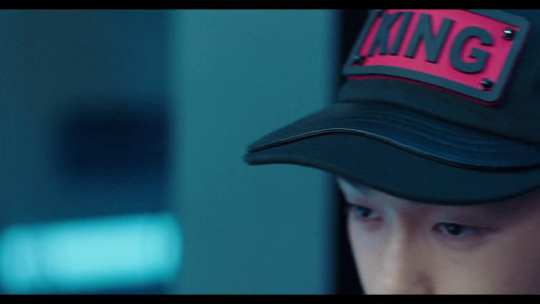
Oh my god he has a hat with his own name on it. He has to be the antagonist. What a douche.
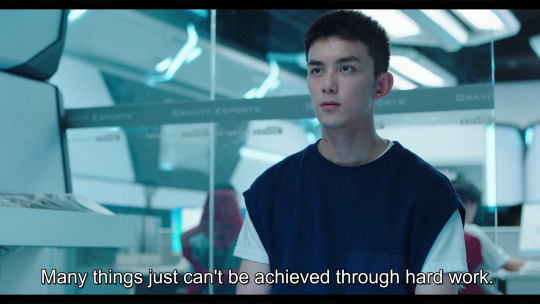
"In this team who you are related to is more important than what you can do." God, I hope he finds a better less capitalist team to play for
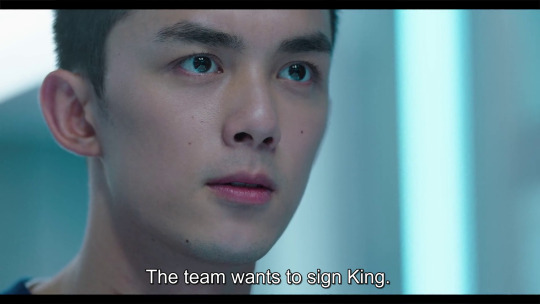
Of course they do. Because his dad is an investor.

Oh please tell them to fuck off


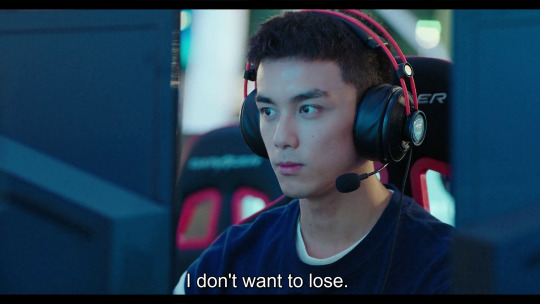
YES! Destroy them!

Apparently flashback kid is Time Raiders Wu Xie. I have blocked most of Time Raiders from my mind (apart from the stupid dancing to escape a trap scene)
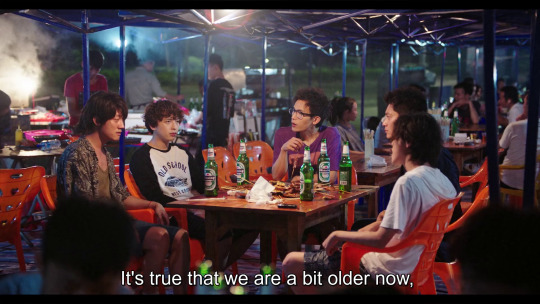
I don't know how old Xiao Feng is supposed to be but he's older than their 22 year old youngest player. I thought he was a teenager.
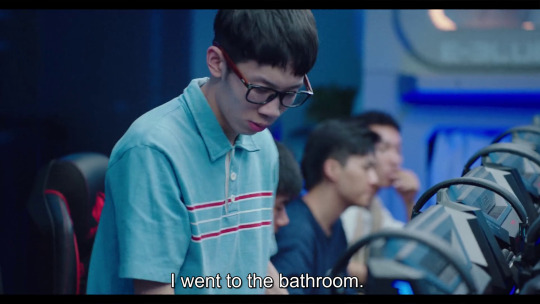
I don't even know you and I know you're lying. You totally took the substitute deal and you're going to throw the game, I can tell.

Okay, I was wrong about throwing the game but GASP they falsely accused him of cheating. I'm not even joking I did legit gasp
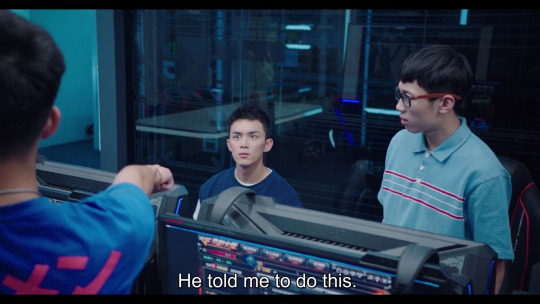
This is even worse than him throwing the game. HE WAS YOUR BRO!

Okay, really don't like his dad manhandling him and even bathing him without even asking
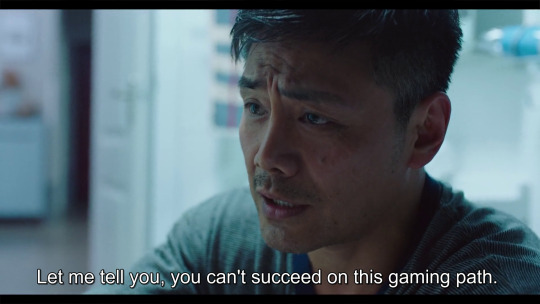
Ah, I'm seeing some parallels between him and Xiao Feng

Oh my god is he going to start gaming on his old Windows XP laptop after his dad confiscated his computer? Will that even run a modern game?

Ah, he's 25. I suppose that is quite old in terms of pro esports careers

"We need to save electricity because we're broke but I'm now going to lie in bed clicking the lamp on and off repeatedly because I'm sad."
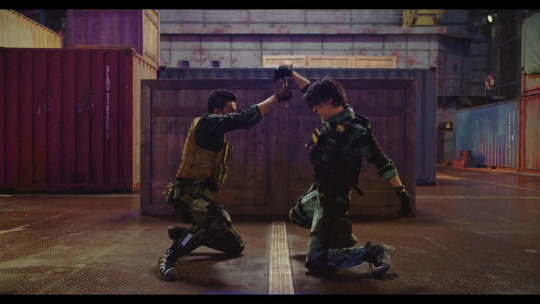
Okay, I don't know who has time travelled or even if anyone has time travelled but apparently internet magic has enabled them to meet in-game. This is FUN.
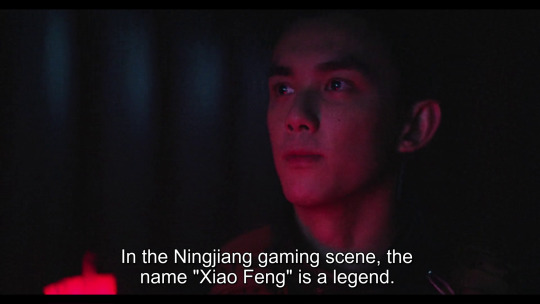
Aww Xiao Feng made it as a pro gamer in the end. I assume he's still alive in Liu Xiaobei's time. Can he go and meet up with the older version of this dude he just met?
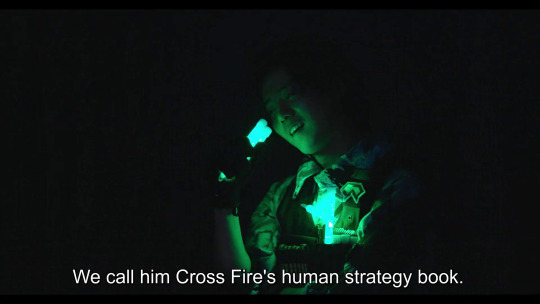
Well, that sounds familiar

I love that that's the conclusion he reaches and not that someone is just fucking with him. I could tell someone it was 2008 now and back it up with facts because I was in my 20s then.
That was fun! Wasn't expecting the wibbly wobbly timey wimey stuff. I really should read the synopsis for a drama before I start it
8 notes
·
View notes
Text
ChouGAMER!! Pretty Cure Info Post
This is not comprehensive, and I'm missing a lot of nomenclature for transformation items, finishers, and alternate forms/styles. I'm also lacking visual references for a few of the villains.
Let's start with the Cures!
The Pretty Cure are the legendary gamers of Virtua Land, who even have a temple to enshrine the new incarnations of each of the four Legends. The temple is overseen by the Grand Wizard, whose duty is to find the next generation of Pretty Cure should crisis befall Virtua Land.
To transform, the Cures need two things: their Check Pendant, a necklace/communicator that contains their "save data", and one of three Game Cards, devices that resemble train passes and contain the "game data", including a piece of equipment unique to each Cure. Every Cure begins at Level 1 and gains EXP via prevailing in combat against the Guricchu. As the "season" progresses, the Cures unlock progressively stronger equipment, finishers, and eventually unlock their second and third Game Cards.

Yuuki Igarashi is our white lead Cure, Cure Legend. Her theme is classic JRPGs such as Final Fantasy and Dragon Quest. Though she strikes a very gyaru-like image, don't be fooled—she's a hardcore gamer, though she initially keeps that side of herself hidden from her classmates. Her friends call her Yuu-tan. Her initial Game Card is Innocent Fantasy, which comes with the equipment Brave Sword.
Yuuki is 5'3", weighs 104 pounds, has an AB blood type, and her three sizes are 83-57-84. She is 16 at the start of the "season", and her birthday is January 1st.

Kaya Karizaki is our blue Cure, Cure Bullet. Her theme is shooter games, both military-style FPS-es and bullet hell games. Kaya is quite egotistical and self-absorbed due to being a champion eSports player, but she's also a fiercely loyal friend who's not afraid to throw hands to protect those she loves. Her initial Game Card is Dangan XX, which comes with the equipment Buster Shot K.
Kaya is 5'5", weighs 113 pounds, has an O blood type, and her three sizes are 82-55-82. She is 17 at the start of the "season", and her birthday is October 10th.

Mika Hayase is our red Cure, Cure Turbo. Her theme is racing games, specifically arcade-style racing games. In comparison to the outgoing Yuuki and the loud, boisterous Kaya, Mika is extremely shy and difficult to approach, let alone talk to. Her family owns an auto repair shop with an attached junkyard, and she's spent several years working on cars and fixing up junkers for her parents to sell. Despite her shyness, she gets extremely intense when playing racing games. Mika's initial Game Card is Gekisou Full Throttle, which comes with the equipment Turbo Rusher.
Mika is 5'4", weighs 119 pounds, has an A- blood type, and her three sizes are 87-58-89. She is 18 at the start of the "season", and her birthday is on August 8th.

Ren Tatsumaki is our yellow Cure, Cure Dragon. Her theme is fighting games, specifically arcade-style fighting games. Ren is a strange individual in every conceivable way, from being notably very tall to not understanding what should be basic common knowledge. Frankly speaking, she's simply an eccentric weirdo that's difficult to understand, but her skill at fighting games is unmatched. Ren's initial Game Card is Kachidoki Prizefight, which comes with the equipment Champion Knuckle.
Ren is 5'10" and weighs 122 pounds, has a B+ blood type, and her three sizes are 80-56-82. She is 17 at the start of the "season", and her birthday is on July 7th.

Fia is our mid-season redeemed villain purple Cure, Cure Fever. Her theme is twofold: rhythm games and puzzle games. As a former agent of the Guricchu, Fia has a difficult time understanding almost everything about human culture, and her seeming inability to express emotion compounds that. If you do get a rise out of her, woe unto you.
Fia is 5'2" and weighs ??? pounds, has a ?? blood type, and her three sizes are ??-??-??. She is ?? at the time she joins the team, and her birthday is on November 11th.

Arcade is not a Cure in and of herself, but rather is the Cures' token helper from another world. She's a level 1000 Grand Wizard and keeper of the Legendary Temple in Virtua Land, which has been invaded by the Guricchu. As the keeper of the Legendary Temple, it falls to Arcade to find the four Legendary Gamers, the Pretty Cure, and save Virtua Land.
Arcade is a prodigy, being the youngest Grand Wizard in Virtua Land's history, and that comes with a bit of an ego. However, she cares deeply about games, and Virtua Land as a whole, and as such takes her position as aide to the Legendary Gamers very seriously. She also talks quite archaically, funnily enough.
Arcade is 4'9", weighs 94 pounds, has a ?? blood type, and her three sizes are 78-54-79. She is ??? at the start of the "season", and her birthday is December 12th.
Now for some villains!
The villains in ChouGAMER!! Precure are the Guricchu, an insectoid alien race that harvest negative feelings that stem from people playing video games, whether it's anger, sadness, or anything else. The monsters they summon are called Fukoheida, and the grunts that accompany Fukoheida are called Chumins.

Gokipunch is the first and most prominent general in the "season". Though quite weak at first, Alphan's philosophy of winning through trickery spoke to her, and she opportunistically took advantage of several moments of weakness among her higher-ups to get promoted to one of Alphan's generals, something unheard of among her caste of Guricchu.
Gokipunch is quite mean-spirited, often mocking the Cures or picking at their individual insecurities to get them to falter in battle. She also has the ability to inflict [Charm] status on civilians, causing them to follow her orders until the spell is broken. Her Fukoheida have her antennae and bright pink eyes, while her Chumins are all cockroach-inspired. Gokipunch herself is loosely themed on dating sims and visual novels.

Mothrom is the second of Alphan's generals to appear. Though seemingly disinterested and lethargic, she's arguably more sadistic and cruel than Gokipunch, using her associated [Poison] status on civilians and Cures alike to harvest higher quantities of negative energy and summon stronger Fukoheida.
Mothrom is loosely themed around tabletop games, and many of the Fukoheida she summons are with the aid of painted miniatures that she's often shown working on during the "episodes" she appears in.

Fear is Fia pre-redemption, and serves as the first dark/evil Cure figure for the girls to fight. Her battle form is themed off of horror games, from slasher thrillers to zombie games to survival horror. Eventually, she's defeated by the ChouGAMER!! team and later joins them.

Deadhand is the second humanoid general and quasi-dark/evil Cure figure. Deadhand is Alphan's hunting dog of sorts, and is originally summoned to recapture Fia and bring her back, but eventually Alphan orders them to destroy the Precure. The resemblance to Kaya is quite uncanny, and mentioned several times over the course of the "season". Deadhand's combat abilities are themed around card games, and they have a deck of ability cards they swipe through the card reader on their wrist to fight with.

Alphan is the leader of the Guricchu. She shows a fondness and even care for her subordinates, but when it comes to Earth and particularly the Precure (and those they love), the best way to describe her is heartless and cruel. At the end of the day, she wants them to suffer and harvest their energy.
#innocent fantasy ; yuuki#dangan xx ; kaya#gekisou full throttle ; mika#gangan prizefight ; ren#forever fever ; fia#push your buttons ; gokipunch#gacchiri slasher ; fear#hangman ace ; deadhand#game breaker ; alphan#poisoned powder ; mothrom#virtua wizard ; arcade
4 notes
·
View notes
Text
The Future of Fantasy Sports: What’s Next for Players?
Fantasy sports have grown from a niche hobby into a multi-billion-dollar industry, attracting millions of players worldwide. With advancements in technology, new formats, and increasing global participation, the future of fantasy sports looks brighter than ever. If you love to play fantasy sports, you’re in for some exciting changes in the coming years.

In this blog, we’ll explore emerging trends, technological advancements, and what’s next for fantasy sports enthusiasts.
The Growth of Fantasy Sports: Where We Are Today Fantasy sports have evolved significantly over the past decade. Initially, most leagues were season-long, requiring long-term commitment. Today, players can choose from a variety of formats, including daily fantasy sports (DFS), best-ball leagues, and real-money contests. Fantasy Sports by the Numbers: Over 100 million players worldwide participate in fantasy sports. The global fantasy sports market is projected to surpass $50 billion by 2030. The rise of fantasy cricket, esports, and niche sports has expanded the industry beyond football and basketball. The increasing demand for real-time stats, interactive features, and cash contests is shaping the next phase of fantasy sports.
The Impact of Technology on Fantasy Sports Advancements in artificial intelligence (AI), blockchain, and augmented reality (AR) are revolutionizing the way we play fantasy sports. How Technology Is Changing the Game:
AI-Powered Fantasy Sports Platforms AI is helping players make data-driven decisions with real-time stats and predictions. Fantasy apps now provide automated lineup suggestions based on player performance trends. AI tools analyze injury reports, game conditions, and opponent matchups to improve team selection.
Blockchain and NFTs in Fantasy Sports Blockchain ensures fair play and transparency by securing player data. Some platforms use NFTs (non-fungible tokens) to allow users to own unique digital assets like virtual player cards. NFT-based fantasy leagues are emerging, where users can trade and sell digital players just like in real-world sports.
Augmented Reality (AR) Enhancing User Experience AR will soon allow users to visualize fantasy stats in real time using smart glasses or mobile devices. Fantasy platforms may introduce AR-driven draft rooms, where players can create immersive team selection experiences. These innovations will make fantasy sports more interactive and engaging than ever before.
The Rise of Daily Fantasy Sports (DFS) and Real-Money Contests Traditional season-long fantasy leagues remain popular, but daily fantasy sports (DFS) have gained massive traction. Why DFS Is the Future of Fantasy Sports: Instant gratification – No need to wait an entire season to win; results are determined in a single day or week. More flexibility – Players can enter and exit contests whenever they want. Bigger prizes – Many DFS platforms offer large cash rewards for top performers. Top DFS Platforms: DraftKings & FanDuel – Leading DFS providers in the U.S. Dream11 & My 11Circle – Popular DFS platforms for cricket and other global sports. Underdog Fantasy & PrizePicks – Specializing in pick’em-style fantasy games. As regulations evolve, real-money fantasy sports will continue expanding worldwide, making DFS more accessible to global players.
The Growth of Fantasy Esports and Alternative Sports Fantasy sports aren’t just for traditional games like football and basketball anymore. Fantasy esports and niche sports are seeing rapid growth.
Fantasy Esports on the Rise With the booming popularity of League of Legends, Dota 2, and Call of Duty, esports fantasy leagues are growing. Platforms now allow users to draft professional esports players and compete for points based on real-game performance. Fantasy esports appeals to younger audiences who are more engaged in competitive gaming.
Expansion into Alternative Sports Fantasy sports are moving beyond mainstream leagues, covering MMA, Formula 1, cycling, and even golf. Sports fans now have more options to play fantasy sports beyond traditional team-based games. As new fantasy sports markets emerge, we can expect a broader range of competitions and contests.
Social and Community-Driven Fantasy Sports The future of fantasy sports isn’t just about winning—it’s about social engagement.
Private Leagues and Group Challenges More players are creating custom leagues with friends, family, and colleagues. Social media integration allows users to share lineups, trash talk, and track leaderboards easily.
Live Streaming and Fantasy Sports Platforms are combining fantasy sports with live streaming, allowing users to follow games while managing their teams. Twitch, YouTube, and other live-streaming services now feature fantasy sports-related content, including expert analysis and player breakdowns. The social aspect of fantasy sports will keep players engaged and create stronger fantasy communities.
What to Expect in the Future of Fantasy Sports As fantasy sports continue to evolve, we can expect several exciting trends:
AI Coaches and Personalized Insights AI-powered fantasy coaches will suggest roster changes, trade opportunities, and weekly lineup optimizations.
Virtual Reality (VR) Fantasy Drafts Future fantasy drafts may take place in VR environments, allowing users to interact with other players in a virtual draft room.
Expansion of Legalized Fantasy Sports Betting More countries are legalizing fantasy sports betting, making real-money fantasy competitions more widely available.
Cross-Sport Fantasy Contests Platforms may introduce fantasy leagues that combine multiple sports (e.g., drafting a team with both football and basketball players). With technology, social features, and new formats, fantasy sports will become even more immersive and competitive.
How to Stay Ahead in the Changing Fantasy Sports World To play fantasy sports successfully in this evolving landscape, you need to adapt and improve your strategies.
Stay Updated on New Platforms Try out new fantasy apps that offer AI-driven insights and innovative gameplay.
Experiment with Different Formats Don’t just stick to season-long leagues—explore DFS, NFT-based leagues, and alternative sports.
Follow Expert Analysis Subscribe to fantasy sports podcasts, YouTube channels, and expert blogs to gain insights.
Engage with the Fantasy Community Join online fantasy sports groups and social media discussions to share strategies and tips. By staying ahead of the trends, you can become a top fantasy sports player in the years to come.
Final Thoughts: Play Fantasy Sports and Be Part of the Future Fantasy sports are more than just a game—they are a global phenomenon that continues to evolve with new technology, formats, and competitive opportunities. Whether you're a beginner or a seasoned player, now is the perfect time to play fantasy sports and experience the future of this exciting industry. So, get ready for what’s next! Join a fantasy league today, explore new formats, and take your fantasy sports game to the next level!
0 notes
Note
Redline is co-owned by Atze and Max, fyi. Also, why are you comparing a sim racing team with Quadrant, who is anything but a sim racing team? Redline are champions and a top team in sim racing competitions, while Quadrant doesn't even participate in any sim racing events.
"quadrant actually has competent people in charge and makes quality content"
content? Redline is a racing team, not influencers whose jobs are to create content. Are you going to say the same about F1? By your logic, if a team creates quality YouTube videos or has a better social media presence than they're better than a racing team. Do you know what sport is? Performance, not "content". Redline are a racing team, then need to be good at racing, not twitch streams or call of duty or whatever game out there.
I hope you realise you just insulted the entire sim racing community by calling the current Esports WC champions, IMSA Esports GC champions and the INDYCAR iRacing champion incompetent, if the drivers from Redline, who is one of the best teams in iRacing and a top team in the sim racing community, are 'not competent' then the rest of the drivers who are competing against them and losing are what?
Honestly, why are people who have no knowledge of sim racing giving their biased opinions on redline and Max? Under the pretext that you hate MG, you are insulting people that have no relation to her whatsoever.
I don't want to draw any conclusions, anon, but you sound exactly like the Max haters. If you are so bothered by him, then block him and everything to do with him. Go outside, touch some grass, being this hateful towards a person who will never even know you exist is not healthy.
That sounds a lot like the shit minions write therefore

0 notes
Text
Wheon Latest Gaming News: Your Ultimate Source for Gaming Updates

The world of gaming evolves rapidly, with new releases, technological advancements, and eSports events reshaping the industry. For gaming enthusiasts and professionals, staying updated is vital. Wheon Latest Gaming News stands out as a trusted platform delivering timely, accurate, and comprehensive news from the gaming universe. This article dives into the unique offerings of Wheon and why it’s the go-to destination for gaming updates.
Key Features of Wheon Latest Gaming News
Comprehensive Coverage
Wheon provides in-depth news on:
Upcoming game launches and reviews
Updates, patches, and bug fixes
eSports tournaments, player highlights, and results
Industry insights and emerging technologies
Timely Updates
With a commitment to real-time reporting, Wheon ensures readers stay informed about breaking news and trends as they happen.
Diverse Content Formats
From detailed articles and opinion pieces to videos and infographics, Wheon caters to varied content preferences, making it accessible to all.
Expert Opinions
Wheon delivers professional analyses and opinions, offering valuable insights into gaming strategies and industry dynamics.
Latest Trends in Gaming Highlighted by Wheon
Dominance of Mobile Gaming
Wheon regularly features top-performing mobile games like "PUBG Mobile," "Genshin Impact," and "Call of Duty: Mobile," which continue to break engagement records.
Growth of eSports
Major eSports tournaments, including "League of Legends Worlds" and "Valorant Champions," are covered extensively, showcasing teams, players, and achievements.
Emerging Technologies
Cutting-edge advancements such as virtual reality (VR), augmented reality (AR), and blockchain gaming are frequently explored, shedding light on the future of gaming.
Why Choose Wheon for Gaming News?
Accuracy and Reliability
Wheon prioritizes factual reporting, ensuring every piece of news is thoroughly vetted.
Global Reach
Covering gaming news from across the globe, Wheon connects readers with the international gaming community.
Interactive Community
Through forums, comment sections, and social media, Wheon fosters an engaged community of gamers who share insights and experiences.
Frequently Asked Questions
Q1. What is Wheon Latest Gaming News?
Ans: Wheon is a leading platform that provides comprehensive updates, reviews, and trends in the gaming industry.
Q2. Does Wheon cover eSports events?
Ans: Yes, Wheon offers extensive coverage of eSports tournaments, including schedules, results, and player spotlights.
Q3. Can I find news about mobile gaming on Wheon?
Ans: Absolutely! Wheon features the latest updates on popular mobile games and new releases.
Q4. Is Wheon free to access?
Ans: Yes, Wheon provides free access to its news content, with options to subscribe for exclusive updates and features.
Conclusion
Wheon Latest Gaming News is the ultimate platform for gamers seeking up-to-date information on game releases, eSports tournaments, and industry trends. With its reliable reporting, expert analyses, and diverse content formats, Wheon keeps you informed and engaged in the fast-evolving world of gaming. Whether you're a casual gamer or a professional, Wheon is your trusted companion for all gaming news. Explore Wheon today and stay ahead in the gaming universe!
0 notes
Text
Carolina Royal Ravens Merch
The Carolina Royal Ravens are an exciting addition to the realm of professional esports, specifically within the popular Call of Duty League. Based in Charlotte, North Carolina, this American team has made significant waves in the competitive gaming community since its inception. With a strong local fanbase and dedicated players, the Ravens aim to create a lasting impact in the esports scene. Discover why Carolina Royal Ravens merchandise is essential for true fans. From stylish jerseys to comfy hoodies and trendy accessories, this blog discusses top picks for showcasing your team spirit. Buy Carolina Royal Ravens Merch Here!
Carolina Royal Ravens Merchandise
Men Carolina Royal Ravens Merch
Women Carolina Royal Ravens Merch
Official Carolina Royal Ravens Merch Store
New Carolina Royal Ravens Merch Shop
Carolina Royal Ravens Merch 2025
Carolina Royal Ravens Merch Long Sleeve
Carolina Royal Ravens Merch Women's Tee
Carolina Royal Ravens Merch Hoodie
Carolina Royal Ravens Merch T Shirt
Carolina Royal Ravens Merch Shirt
Carolina Royal Ravens Official Merch
#carolinaroyalravensmerch #carolinaroyalravensmerchandise
1 note
·
View note
Text
Los Angeles Thieves Merch
The Los Angeles Thieves, also known as LA Thieves, are an American professional esports team competing in the Call of Duty League. Based in the vibrant city of Los Angeles, California, this team is a proud member of the 100 Thieves organization, which is renowned for its involvement in various gaming and lifestyle sectors. Explore the vibrant world of Los Angeles thieves merch, a unique blend of streetwear influenced by artistry and societal trends. Discover its evolution from simple designs to bold collections that express identity and lifestyle. Buy Los Angeles Thieves Merch Here!
Los Angeles Thieves Merchandise
Official Los Angeles Thieves Merch Store
New Los Angeles Thieves Merch Shop
Los Angeles Thieves Merch 2025
Los Angeles Thieves Merch Long Sleeve
Los Angeles Thieves Merch Women's Tee
Los Angeles Thieves Merch Hoodie
Los Angeles Thieves Merch T Shirt
Los Angeles Thieves Merch Shirt
Los Angeles Thieves Official Merch

#losangelesthievesmerch #losangelesthievesmerchandise
1 note
·
View note
Text
Boston Breach Merch
Based in the vibrant city of Boston, Massachusetts, the Boston Breach is a professional esports team that has made its mark in the Call of Duty League. Owned by Kraft Sports Group and Oxygen Esports, this team brings a unique blend of competitive spirit, local pride, and a dedication to excellence in gameplay. Discover the wide range of Boston Breach merchandise that allows fans to showcase their loyalty to one of the top teams in competitive gaming. From stylish jerseys and hoodies to exclusive signed memorabilia, there’s something for every supporter. Buy Boston Breach Merch Here!
Boston Breach Merchandise Men Boston Breach Merch Women Boston Breach Merch Official Boston Breach Merch Store New Boston Breach Merch Shop Boston Breach Merch 2025 Boston Breach Merch Long Sleeve Boston Breach Merch Women's Tee Boston Breach Merch Hoodie Boston Breach Merch T Shirt Boston Breach Merch Shirt Boston Breach Official Merch
#bostonbreachmerch #bostonbreachmerchandise
Website: https://bostonbreachmerch.com/

1 note
·
View note
Text
Optic Texas Merch
Optic Texas is an American professional Call of Duty League (CDL) esports team, based in the vibrant city of Dallas, Texas. Established by the renowned organization, Optic Gaming, this team is set to make a significant impact in the world of competitive gaming. With a passionate fan base and a commitment to excellence, Optic Texas is poised to become a formidable competitor in the league. Discover the exciting range of Optic Texas merchandise, a leading name in esports. From stylish apparel like t-shirts and hoodies to innovative gaming accessories, Optic Texas caters to fans and gamers alike. Buy Optic Texas Merch Here!
Optic Texas Merchandise
Optic Texas Gaming Merch
Men's Optic Texas Merch
Women's Optic Texas Merch
Optic Texas Merch Uk
Official Optic Texas Merch Store
New Optic Texas Merch Shop
Optic Texas Merch 2025
Optic Texas Merch Long Sleeve
Optic Texas Merch Women's Tee
Optic Texas Merch Hoodie
Optic Texas Merch T Shirt
Optic Texas Merch Shirt

#optictexasmerch #optictexasmerchandise
1 note
·
View note
Text
Online Gaming PC in Budget UK – Savitar Technology

In the fast-paced world of online gaming, having the right gaming PC is essential to stay competitive and fully enjoy the immersive experiences modern games offer. However, many gamers often face the challenge of finding a high-performance gaming PC that doesn’t break the bank. Savitar Technology, a leading name in the gaming PC industry, has made it their mission to bring affordable yet powerful gaming PCs to the UK market. Here’s how you can achieve your dream gaming setup without exceeding your budget.
Affordable Yet High-Quality Components
Savitar Technology understands that a gaming PC is only as good as its components. That’s why they carefully select high-quality parts that provide excellent performance while keeping costs in check. From powerful CPUs and GPUs to fast SSD storage and reliable cooling systems, Savitar’s budget-friendly gaming PCs are built to deliver smooth gameplay even on the most demanding titles.
One of the biggest advantages of buying from Savitar Technology is their commitment to sourcing components that offer the best value for money. Their systems are equipped with mid-range yet highly capable graphics cards like the NVIDIA GeForce GTX 1660 or AMD Radeon RX 6600, ensuring excellent performance for popular games such as Fortnite, Call of Duty: Warzone, and Apex Legends.
Customization for Every Gamer
Every gamer has unique preferences, and Savitar Technology makes it easy to tailor your gaming PC to meet your specific needs. Their range of customizable options allows you to choose everything from the amount of RAM and type of storage to the design and lighting of your PC case. This ensures that you’re not only getting a Online Gaming PC in Budget UK that performs well but also one that reflects your personal style.
Additionally, Savitar’s experts are on hand to guide you through the customization process, helping you make informed decisions that align with your gaming goals and budget. Whether you’re a casual gamer looking for an entry-level system or an aspiring esports player in need of a performance-driven rig, Savitar Technology has you covered.
Exclusive Deals and Financing Options
Savitar Technology goes above and beyond to make gaming PCs accessible to everyone. They regularly offer exclusive discounts and bundle deals on their products, helping you save even more. For those who prefer to spread the cost over time, Savitar also provides flexible financing options, making it easier than ever to invest in a high-quality gaming PC without upfront financial strain.
Reliable Support and Warranty
Investing in a gaming PC can be daunting, especially if you’re new to the world of PC gaming. That’s why Savitar Technology provides exceptional customer support to guide you before, during, and after your purchase. Their team of professionals is always ready to assist with setup, upgrades, and troubleshooting.
All Savitar gaming PCs come with a comprehensive warranty, giving you peace of mind and ensuring that your investment is protected. Their reliable support and after-sales service have made them a trusted name among gamers across the UK.
For more details, you can visit us:
Cheapest Online Gaming PC in Budget UK
Best Budget Gaming Computer in UK
Smooth Gaming PC for Esports
#Best Budget Gaming Tower with Core i5 Processor#Budget Gaming Tower with RGB lighting#Affordable Gaming PC Bundle with Intel Core i5
0 notes
Text
How Do Fantasy Sports Platforms Monetize Esports in India?
The fusion of fantasy sports and esports has emerged as a powerful combination in India, providing a unique opportunity for platforms to generate revenue. With the country’s gaming industry booming, fantasy sports platforms have quickly adapted to incorporate esports, creating new revenue streams that appeal to both gamers and sports enthusiasts.
In this article, we’ll explore how fantasy sports platforms monetize esports in India through a variety of strategies and models, from in-app purchases to sponsorships, affiliate marketing, and more.
1. Fantasy Esports Leagues and Tournaments
Fantasy sports platforms have successfully integrated esports tournaments into their offerings by creating fantasy leagues centered around popular esports titles such as PUBG Mobile, Free Fire, Dota 2, CS:GO, and Call of Duty: Mobile. In these leagues, users select a team of virtual players or in-game characters, earning points based on their performance in real-world tournaments and matches.
This approach mirrors traditional fantasy sports, but with a digital twist that caters to the competitive gaming community. Players engage in these leagues, building teams based on their understanding of esports dynamics. As these fantasy esports leagues grow in popularity, fantasy platforms draw revenue from multiple sources, including entry fees, in-game purchases, and premium features.
These platforms also often offer huge prize pools for tournament winners, further incentivizing players to participate and invest. As esports tournaments increase in scale, the revenue potential grows. Furthermore, many fantasy platforms partner with tournament organizers, providing them with a steady stream of sponsorships and advertisements.
2. In-App Purchases and Microtransactions
In-app purchases are one of the most significant monetization strategies for fantasy sports platforms in India, and they are especially important when it comes to esports. These platforms often offer premium memberships that unlock advanced features, special team-building tools, and exclusive content. Additionally, users can purchase in-game items like player upgrades, additional fantasy team slots, and entry tickets for higher-tier leagues.
These microtransactions enhance the gaming experience, providing both a competitive advantage for players and exclusive perks for premium subscribers. For the platform, these purchases serve as an ongoing revenue source. Over time, platforms are able to build a dedicated user base willing to spend money on virtual goods in exchange for enhanced experiences.
3. Advertising and Sponsorships
With the growing popularity of esports in India, fantasy sports platforms are capitalizing on the high volume of active users by integrating advertising within their apps, websites, and during live-streamed events. Advertisers are eager to target the gaming demographic, which tends to be young, tech-savvy, and highly engaged.
Platforms often allow brands to sponsor esports leagues or individual players, providing brands with access to a large and engaged audience. Brands such as Red Bull, Pepsi, Amazon, and gaming hardware companies are keen to tap into this market by advertising during major esports events.
Platforms can also integrate ads within fantasy sports apps in various formats, including banner ads, video ads, and pop-ups. With millions of active users, these ad placements generate substantial revenue.
Additionally, esports events themselves attract sponsorship deals from both global and local brands. Fantasy sports platforms hosting esports leagues benefit from these partnerships, earning a share of the sponsorship deals. As a result, sponsorships are a vital part of monetizing esports in India, with both direct sponsorships for events and indirect sponsorships through advertising partnerships driving a significant portion of the revenue.
4. Affiliate Marketing and Partnerships
Affiliate marketing plays a key role in the monetization of fantasy sports platforms in India. These platforms frequently partner with gaming hardware companies, gaming app developers, streaming services, and other relevant businesses to promote their products and services.
For example, fantasy sports platforms may collaborate with brands like Logitech, ASUS, or Razer to promote gaming accessories and PCs. By featuring these brands in their apps, platforms earn commissions on any sales made through affiliate links or sponsored content. These partnerships not only offer users better deals on products they may need for their gaming experience but also provide the platform with additional revenue from affiliate commissions.
Fantasy sports platforms also work with game developers and esports organizations to cross-promote games and events, thus generating more revenue streams through their affiliate networks. These collaborations enable platforms to reach a broader audience and further enhance the gaming ecosystem.
5. Data Analytics and Insights
With massive amounts of user data at their disposal, fantasy sports platforms are able to gather valuable insights into player behavior and preferences. This data can be leveraged to create targeted marketing campaigns or sell data-driven reports to gaming developers, advertisers, and other businesses.
The ability to analyze user activity allows fantasy platforms to tailor their offerings and engage users more effectively. For example, if a platform notices that a segment of users is particularly invested in PUBG Mobile, it can offer them specific fantasy leagues or tournaments based on that game. This targeted marketing increases the likelihood of user participation, leading to higher conversion rates for in-app purchases and paid subscriptions.
In addition, platforms can sell aggregated and anonymized user data to game developers or advertising agencies, providing them with actionable insights into the preferences and behaviors of esports fans. This is a growing revenue stream as the demand for data-driven decision-making in the gaming industry increases.
6. Subscription Models
Another effective monetization strategy is the implementation of subscription models. Many fantasy sports platforms offer premium subscriptions that grant users access to additional benefits such as exclusive tournaments, enhanced analytics, and better chances of winning big through guaranteed spots in higher-tier fantasy leagues.
Subscription models provide a consistent and predictable income stream for fantasy platforms, which can be particularly valuable as they scale their business. Users who are heavily invested in the platform and the esports fantasy leagues are more likely to pay for the perks that come with premium subscriptions. This model also reduces reliance on one-time purchases or entry fees, offering more stability for the platform's revenue.
7. Hosting Esports Events
Some fantasy sports platforms have taken a more direct approach by hosting their own esports tournaments. These events are often exclusive to users of the fantasy platform and feature a mix of paid and free entry options. For paid entry tournaments, the platform collects registration fees from participants, while also offering cash prizes or valuable in-game rewards to the top finishers.
In addition to registration fees, platforms can monetize these tournaments by selling event tickets for live-streamed matches, charging for access to exclusive content, and hosting merchandise sales. These events also attract media coverage and additional sponsorship opportunities from global brands, further boosting revenue.
As esports in India continues to grow, the popularity of live-streamed tournaments hosted by fantasy sports platforms is expected to rise. This could lead to new revenue opportunities, particularly through media rights and licensing deals, as platforms look to expand their reach and brand recognition.
8. Merchandise Sales
Fantasy sports platforms often capitalize on their brand identity by selling official merchandise. This can include t-shirts, hoodies, caps, and gaming gear that feature the platform’s logo or the branding of popular esports teams. Merchandise sales can be an excellent source of income, particularly if the platform has cultivated a loyal fan base.
Platforms can use online stores to sell exclusive merchandise during special events or tournaments, creating additional revenue streams. Merchandise not only provides an opportunity to monetize the esports audience but also helps in branding and creating a sense of community among users.
9. Crowdfunding and Community Support
Some fantasy esports platforms raise funds through crowdfunding, where users contribute financially in exchange for rewards such as special access, early registration for tournaments, or exclusive in-game items. Crowdfunding can be particularly effective for new and emerging platforms that need initial capital to fund their operations and scale up.
Platforms may also run community support programs where loyal users can contribute to the development of the platform, either financially or through other forms of support. These programs foster a sense of ownership among users, who feel more connected to the platform’s success.
10. Licensing and Franchising
As the esports market matures, fantasy sports platforms can look to monetize through licensing deals. For example, they may acquire the rights to operate official fantasy leagues for major esports events or sign exclusive licensing agreements with popular games to offer exclusive tournaments.
Franchising the platform to different regions within India or internationally provides another opportunity for growth and revenue. This allows platforms to expand their operations without the need for large capital investments, while still benefiting from a share of the revenue generated by franchisees.
Conclusion
The monetization of esports in India through fantasy sports platforms has become a significant and growing industry. By employing a combination of strategies such as fantasy leagues, in-app purchases, advertising, sponsorships, affiliate marketing, and more, fantasy sports platforms are tapping into the massive potential of the esports market.
As the esports ecosystem in India continues to grow, new opportunities will emerge for platforms to innovate and generate revenue. With the increasing interest in both fantasy sports and esports, India is poised to become a global hub for gaming, attracting even more investment and players.
For the latest updates on esports events and results, including those related to "Faridabad Live Result," you can visit reputable gaming news websites and official tournament pages. Staying informed through these platforms will provide you with real-time information on ongoing and upcoming esports events in India.
0 notes